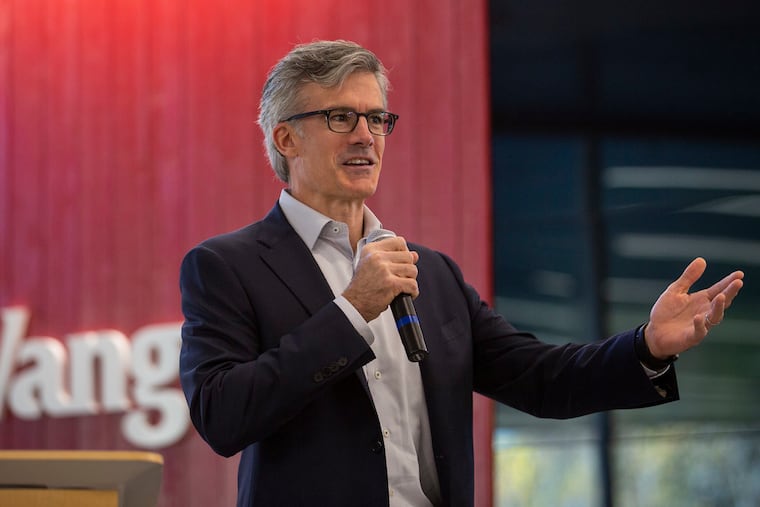Decision day for 1,300 Vanguard workers as their jobs head to India-based Infosys
Vanguard has moved record-keeping, printing, and other basic tasks off-campus before, but never at this scale

Since its founding in 1975, Vanguard Group has grown into the largest for-profit employer in Philadelphia’s western suburbs. Vanguard has displaced the region’s shrunken banks and insurers as its major financial employer; a career there has meant a future in a growing organization that invests more than $5 trillion in other people’s money, among the biggest in its business.
Wednesday marks a break in that history. Staffers (Vanguard calls them “crew’) say today is the deadline for 1,300 of them to move to Infosys, an India-based outsourcing contractor; or leave to search for new jobs.
The workers track 401(k) retirement plans for five million Americans at thousands of employers. Infosys is replacing Vanguard’s aging mainframe-computer-based record-keeping system with a remote, cloud-based platform. To smooth the transition, Infosys has promised ex-Vanguard workers will enjoy similar pay and benefits, in as-yet undisclosed nearby locations, at least over the next year.
But most of Infosys’ 240,000 global staff are based in India, and IT industry veterans and labor observers say it’s inevitable that much of the work will eventually be transfered there, enabling both companies to save due to India’s lower wages.
Vanguard is offering a bonus equal to 25 percent of workers’ Vanguard pay, in exchange for waiving any future claims against Vanguard if things don’t go smoothly with the new employer, according to workers who asked for anonymity because they were not authorized to speak for the company. Vanguard spokeswoman Emily Farrell said the company would not comment on details of the plan.
Crew members with fewer than 15 years of Vanguard service or who are younger than 50 on Oct. 11, when the transition takes effect, face the loss of a coveted perk for “15-and-50″ achievers: a retirement bonus that can sweeten their combined cash and medical savings accounts by as much as $100,000 when they eventually leave Vanguard.
» READ MORE: Vanguard transfers 1,300 staffers to outsourcing partner Infosys, which will open a Malvern center
The workers facing transfer include technology, client-administration and operations staff in Vanguard’s Institutional and Information Technology divisions at Vanguard campus addresses including 45 Liberty; 100 Chesterfield; and 1001 Cedar Hollow, among others.
They will move to “comparable positions” at as-yet-identified Infosys locations “in close proximity to Vanguard’s offices” in Malvern, Charlotte, N.C., or Scottsdale, Ariz., under their current boss, Martha King, who is also transferring to Infosys, according to the company. Between the three sites, Vanguard now has about 18,000 employees.
Workers will get “the same salary” if they stay over the next year, though they aren’t guaranteed a job, any more than if they stayed at Vanguard, Farrell said.
She added that they will get “comparable” benefits for the next year; other employees tell me they have reviewed highlights of the Infosys health program and found it is less comprehensive than Vanguard’s, but added that Vanguard has offered to pay for the difference.
In remarks last week, Mohit Joshi, president of Infosys, stressed quality, not cost. “Our platform will create a new standard for the industry as we seek to drastically improve the retirement savings experience for plan participants and sponsors through the use of cutting-edge digital technologies,” he said.
Pensions and Investments magazine called the deal “unprecedented” for large retirement plans. But in fact, Vanguard has been leading up to a major outsourcing: The company’s small-business 401(k) service, Vanguard Retirement Plan Access, has used a record-keeping system from suburban Philly-based Ascensus since it started nine years ago. Non-qualifying benefit plan records have lately been managed by Newport Retirement Group of Walnut Creek, Calif.
According to Vanguard workers, the company also outsources information technology services. As many as 600 contractors for India-based Tata Consultancy Services (TCS) work on Vanguard projects at buildings along Morehall Road and other sites near Vanguard buildings; other TCS staff in India also work on Vanguard IT.
Outsourcing makes sense, given Vanguard’s history of system crashes, and the promise that a specialized firm such as Infosys could do a better job, according to Daniel P. Wiener, an investment manager who publishes the Independent Adviser for Vanguard Investors.
» READ MORE: Vanguard crew and fans wary of Infosys outsourcing as company adds Malvern center
But “Vanguard employees who will be re-badged as Infosys employees better start looking for new jobs as soon as possible because almost all of them will be let go after the 12-month commitment expires,” predicts Howard University associate professor Ron Hira, who has studied “offshoring” and foreign tech worker visa programs since the early 2000s and testified in Washington on the impact of the H-1B visa program on U.S. workers.
To be sure, offering the workers (as well as customers) a smooth transition “is important public relations for Vanguard, which can argue that it isn’t offshoring and is being a responsible employer,” Hira said.
But outsourcing only makes economic sense if the work is ultimately transferred to a lower-cost center such as India, he added.
Hira noted that IT transfer projects are often slower and more complicated than partners expect. And he said outsourcers typically “displace older workers who have built up benefits” with recent college graduates who account for many outsourcing hires.
“The stock market is doing well. Vanguard is doing well. Why is it offshoring all of these middle-class jobs? Why didn’t it invest in its workers?” Hira concluded. “This is a microcosm of what’s wrong with the economy.”